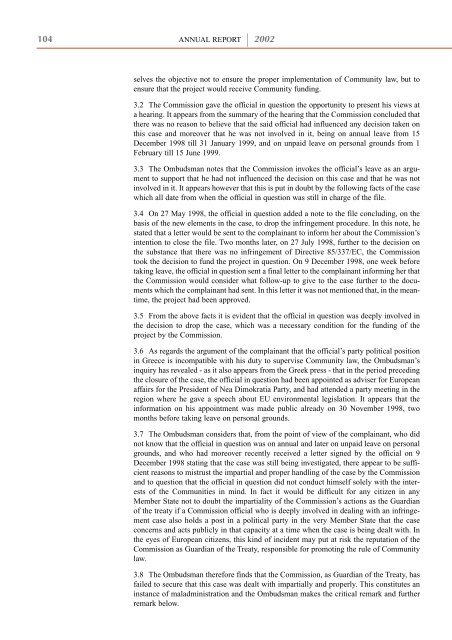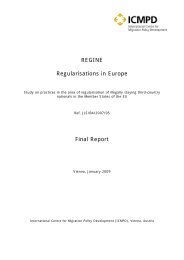Annual report 2002 - EOI
Annual report 2002 - EOI
Annual report 2002 - EOI
Create successful ePaper yourself
Turn your PDF publications into a flip-book with our unique Google optimized e-Paper software.
104 ANNUAL REPORT | <strong>2002</strong><br />
selves the objective not to ensure the proper implementation of Community law, but to<br />
ensure that the project would receive Community funding.<br />
3.2 The Commission gave the official in question the opportunity to present his views at<br />
a hearing. It appears from the summary of the hearing that the Commission concluded that<br />
there was no reason to believe that the said official had influenced any decision taken on<br />
this case and moreover that he was not involved in it, being on annual leave from 15<br />
December 1998 till 31 January 1999, and on unpaid leave on personal grounds from 1<br />
February till 15 June 1999.<br />
3.3 The Ombudsman notes that the Commission invokes the official’s leave as an argument<br />
to support that he had not influenced the decision on this case and that he was not<br />
involved in it. It appears however that this is put in doubt by the following facts of the case<br />
which all date from when the official in question was still in charge of the file.<br />
3.4 On 27 May 1998, the official in question added a note to the file concluding, on the<br />
basis of the new elements in the case, to drop the infringement procedure. In this note, he<br />
stated that a letter would be sent to the complainant to inform her about the Commission’s<br />
intention to close the file. Two months later, on 27 July 1998, further to the decision on<br />
the substance that there was no infringement of Directive 85/337/EC, the Commission<br />
took the decision to fund the project in question. On 9 December 1998, one week before<br />
taking leave, the official in question sent a final letter to the complainant informing her that<br />
the Commission would consider what follow-up to give to the case further to the documents<br />
which the complainant had sent. In this letter it was not mentioned that, in the meantime,<br />
the project had been approved.<br />
3.5 From the above facts it is evident that the official in question was deeply involved in<br />
the decision to drop the case, which was a necessary condition for the funding of the<br />
project by the Commission.<br />
3.6 As regards the argument of the complainant that the official’s party political position<br />
in Greece is incompatible with his duty to supervise Community law, the Ombudsman’s<br />
inquiry has revealed - as it also appears from the Greek press - that in the period preceding<br />
the closure of the case, the official in question had been appointed as adviser for European<br />
affairs for the President of Nea Dimokratia Party, and had attended a party meeting in the<br />
region where he gave a speech about EU environmental legislation. It appears that the<br />
information on his appointment was made public already on 30 November 1998, two<br />
months before taking leave on personal grounds.<br />
3.7 The Ombudsman considers that, from the point of view of the complainant, who did<br />
not know that the official in question was on annual and later on unpaid leave on personal<br />
grounds, and who had moreover recently received a letter signed by the official on 9<br />
December 1998 stating that the case was still being investigated, there appear to be sufficient<br />
reasons to mistrust the impartial and proper handling of the case by the Commission<br />
and to question that the official in question did not conduct himself solely with the interests<br />
of the Communities in mind. In fact it would be difficult for any citizen in any<br />
Member State not to doubt the impartiality of the Commission’s actions as the Guardian<br />
of the treaty if a Commission official who is deeply involved in dealing with an infringement<br />
case also holds a post in a political party in the very Member State that the case<br />
concerns and acts publicly in that capacity at a time when the case is being dealt with. In<br />
the eyes of European citizens, this kind of incident may put at risk the reputation of the<br />
Commission as Guardian of the Treaty, responsible for promoting the rule of Community<br />
law.<br />
3.8 The Ombudsman therefore finds that the Commission, as Guardian of the Treaty, has<br />
failed to secure that this case was dealt with impartially and properly. This constitutes an<br />
instance of maladministration and the Ombudsman makes the critical remark and further<br />
remark below.
















